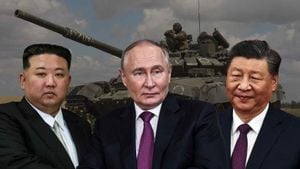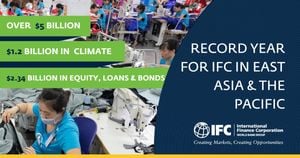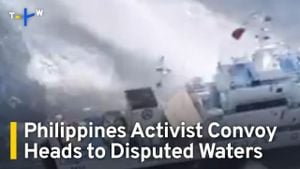Former Philippine President Rodrigo Duterte has made headlines again, this time for his willingness to surrender to the International Criminal Court (ICC) if he decides to do so. The statement, made during his recent appearance before Congress, raised questions not only about Duterte's defiance but also the Philippines' legal obligations should the ICC proceed with its investigations following allegations of crimes against humanity during his controversial war on drugs.
On Wednesday, the Marcos administration indicated it would not obstruct Duterte's potential surrender to the ICC. Executive Secretary Lucas Bersamin clarified, "If the former President desires to surrender himself to the jurisdiction of the ICC, the government will neither object to it nor move to block the fulfillment of his desire." This statement followed Duterte's audacious challenge to the ICC to swiftly initiate the probe he's been under scrutiny for.
Duterte, who sure knows how to stir the pot, called on the ICC to hurry up during the House Quad Committee hearing, insisting he was not afraid of their investigations. "ICC does not scare me a bit," he stated, welcoming the court's presence and expressing his urgency for the inquiry, implying he might not have much time left to face them.
The former President’s insistence on being investigated sooner rather than later reflects not just bravado but also the political dynamics surrounding the upcoming midterms. He stated, "I’ll go to the ICC myself; they’re taking so long! Hurry up! Because I might get old and die before they could investigate me.”
Despite his confidence, the background of the situation is heavy with legal implications. The Philippines officially withdrew from the Rome Statute, which established the ICC, back in March 2019, following the commencement of preliminary examinations on Duterte’s deadly campaign against drugs. The court, for its part, has asserted its jurisdiction over events occurring before the withdrawal, effectively keeping Duterte's actions under the ICC’s purview.
Responding to Duterte's recent statements, Bersamin also conveyed the government's position on the possibility of Interpol issuing a red notice should the ICC pursue this route to enforce arrests. He asserted, "Should the ICC refer the process to Interpol, which may then transmit a red notice to the Philippine authorities, the government will feel obliged to cooperate according to established protocols." This puts the Philippine law enforcement agencies at the intersection of international law and domestic governance.
Human rights advocates have been closely monitoring the developments. More than 6,200 individuals reportedly perished during the Duterte administration's anti-drug operations, but various human rights organizations estimate the true toll to be as high as 30,000. This stark discrepancy raises significant ethical and moral questions about the drug war, exacerbated by the public statements made by Duterte and his administration.
From his often-confrontational rhetoric to his startling willingness to engage with international scrutiny, Duterte’s actions can be viewed both as attempts to consolidate power among his supporters and to challenge the very institutions set up to check governmental excesses.
The political ramifications of this situation are immense. Lecturers at various institutions have noted how Duterte's current stance appears to galvanize his base, showcasing his defiance against what he terms as unwarranted foreign interference. Hansley A. Juliano, for example, suggests Duterte is leaning on his usual bravado to project strength, particularly with the political climate shifting as the 2025 midterm elections draw near.
Interestingly, the Department of Justice reiterated the Philippines’ obligation to honor its commitments to Interpol, emphasizing they remain active members of the international police organization. This means any official requests made through the ICC could be taken seriously, compliculating Duterte’s bravado with the reality of international law. If Interpol does call for his arrest, they are bound by legal obligation to comply, limiting Duterte's margin for escape.
With the world watching closely, the potential for the ICC to take concrete actions against Duterte could redefine not only his legacy but also the Philippines' approach to human rights and accountability on the international stage. If the ICC moves forward with any request for action, it will usher the Philippines back to the center of international human rights discourse, opening old wounds but also possibly paving the way for necessary reform.
Navigators of Philippine politics must now contend with the delicate balance of supporting past leadership versus the global expectation for justice and accountability. Whether Duterte's bravado will manifest as genuine defiance or as cutting through the legal morass will become clearer as events develop.
Overall, as Duterte continues to test the boundaries of his past presidency with his recent remarks, only time will tell how the ICC's interests and Philippine law will collide and how Duterte's narrative will navigate these tumultuous waters.



